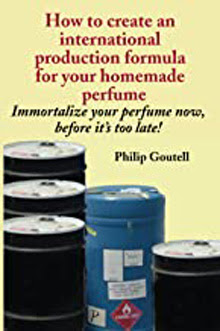A perfume takes birth in the imagination. Only when it is nearly fully conceptualized does the perfumer begin to translate it from the mind into a physical state -- the formula. At this point there are "adjustments" and they can be both in the mental image and in the physical interpretation but, if the conceptualization is sound, the adjustments are more likely to be in the formula -- the tweaks that are now needed to bring the "smell" in line with the communication that was envisioned.
The process of creation in perfumery goes under different names. Personally I think of myself "developing" a new perfume. That's a pretty neutral word. But some write of how they "design" fragrances. To my knowledge, this is a very contemporary (rather than classical) usage, probably inspired by "designer labels" and all that. When I received a sample of a new aroma material from a U.S. distributor they wished me "happy formulating." So yes, the perfumer is a developer, designer, and formulator. But no matter what you call the process, the process amounts to translating a mental image into a physical product -- the perfume.
A very useful intermediate step in this process is pen and paper -- trying to express your mental image in WORDS, before you begin to formulate. Some will cry "foul" over this suggestion. Many great visual artists are clueless when it comes to talking about their art. (In recent years "artists" who understand the sales value of publicity have begun to let their tongues flap more freely.) But in my own experience, when you try to express a mental image in words and encounter difficulty, the difficulty is often due to the mental image being foggy, unclear, or even self-contradictory. Forcing it onto paper helps (me, anyway) clarify my thoughts and expose potential weaknesses in my idea.
The paper plan that precedes a perfume has been very much a part of Stephen V. Dowthwaite's teachings, both in his home study course and in his face-to-face workshops and these have formed much of the basis of my own training. In the world of commercial perfumery, there is the "perfume brief" given to the perfumer by the client to explain, in words, what is desired.
So there is what I would call a "why?" to a perfume -- the reason behind its creation. The perfume itself is a communication of this "why?"
The importance of the "why?"
Ask yourself: why do some works of art endure while others are quickly forgotten? Not all works of art are equal in their influence on the public. Some "connect" and some do not. The "why?" behind the work is of tremendous importance because it is in this "why?" that the work takes on its significance.
If the reason for creating the perfume is simply, say to make use of a particular note that interests the perfumer, it is unlikely that the physical product, however skillfully constructed, will produce a memorable experience for others.
But if in the "why?" of the perfume, the perfumer is thinking that he or she wants to use this particular note because it recalls a certain association -- an association that might be shared by others -- then in thinking of how that associative note might be reinforced by other materials, we're beginning to develop a concept that, if well executed, is far more likely to resonate. And, important from a commercial point of view, the perfume now becomes much easier to advertise and promote because the perfume communicates the story of the "why?" and the "why?" itself is of greater significance to others.
When we start out making perfume we are pleased simply to master enough technology to be able to get a nice smelling fragrance in a bottle. As we rise from apprenticeship to artistry, we find this isn't enough. We find ourselves thinking more about what we are about to do before we do it. We clarify our vision, double check, test it, refine it -- in our minds -- until we are bubbling over with a need to communicate THIS vision in the physical product, the perfume.
Not surprisingly, as this happens, our perfumers get "better" and become easier to "explain" -- because our vision and the perfume we have created become one.
Sunday, June 13, 2010
Subscribe to:
Post Comments (Atom)


No comments:
Post a Comment